Related Research Articles

Get Carter is a 1971 British gangster film, written and directed by Mike Hodges in his directorial debut and starring Michael Caine, Ian Hendry, John Osborne, Britt Ekland and Bryan Mosley. Based on Ted Lewis's 1970 novel Jack's Return Home, the film follows the eponymous Jack Carter (Caine), a London gangster who returns to his hometown in North East England to learn about his brother's supposedly accidental death. Suspecting foul play, and with vengeance on his mind, he investigates and interrogates, regaining a feel for the city and its hardened-criminal element.
Amicus Productions was a British film production company, based at Shepperton Studios, England, active between 1962 and 1977. It was founded by American producers and screenwriters Milton Subotsky and Max Rosenberg.

Dracula is a 1958 British gothic horror film directed by Terence Fisher and written by Jimmy Sangster based on Bram Stoker's 1897 novel of the same name. The first in the series of Hammer Horror films starring Christopher Lee as Count Dracula, the film also features Peter Cushing as Doctor Van Helsing, along with Michael Gough, Melissa Stribling, Carol Marsh, and John Van Eyssen. In the United States, the film was retitled Horror of Dracula to avoid confusion with the U.S. original by Universal Pictures, 1931's Dracula.
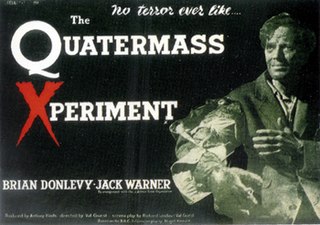
The Quatermass Xperiment is a 1955 British science fiction horror film from Hammer Film Productions, based on the 1953 BBC Television serial The Quatermass Experiment written by Nigel Kneale. The film was produced by Anthony Hinds, directed by Val Guest, and stars Brian Donlevy as the titular Professor Bernard Quatermass and Richard Wordsworth as the tormented Carroon. Jack Warner, David King-Wood, and Margia Dean appear in co-starring roles.

Tigon British Film Productions or Tigon was a film production and distribution company, founded by Tony Tenser in 1966.

The Comeback is a 1978 British psychological horror slasher film directed and produced by Pete Walker and starring Jack Jones, Pamela Stephenson, and David Doyle. Its plot follows a successful but dormant American singer who retreats to a remote manor in Surrey to record an album; there, he is followed by a psychopath—donning a hag mask—who murdered his ex-wife.

I Drink Your Blood is a 1971 American exploitation horror film written and directed by David E. Durston, produced by Jerry Gross, and starring Bhaskar Roy Chowdhury, Jadine Wong, and Lynn Lowry. The film centers on a small town that is overrun by rabies-infected members of a Satanic hippie cult after a revenge plot goes horribly wrong.
Richard Paul Ferris was an English composer and actor. Born in Corby, Northamptonshire, England, Ferris provided scores for various low budget British horror films during the late 1960s and early 1970s.

Milton Subotsky was an American film and television writer and producer. In 1964, he founded Amicus Productions with Max J. Rosenberg. Amicus means "friend" in Latin. The partnership produced low-budget science fiction and horror films in the United Kingdom.
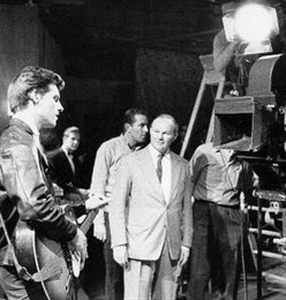
Lance Comfort was an English film director. In a career spanning over 25 years, he became one of the most prolific film directors in Britain, though he never gained critical attention and remained on the fringes of the film industry, creating mostly B movies.
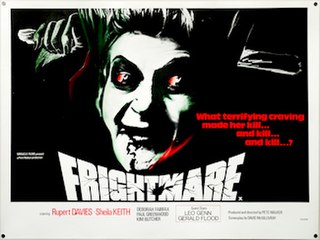
Frightmare is a 1974 British horror slasher film directed and produced by Pete Walker, written by David McGillivray and starring Rupert Davies and Sheila Keith. The story focuses around Dorothy and Edmund Yates, who have recently been released from a mental asylum, and is one of Pete Walker's most notable films.
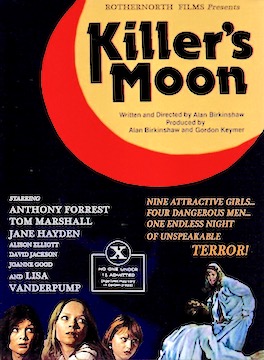
Killer's Moon is a 1978 British slasher film written and directed by Alan Birkinshaw, with uncredited dialogue written by his novelist sister, Fay Weldon, and starring Anthony Forrest, Tom Marshall, Jane Hayden, JoAnne Good, Nigel Gregory, David Jackson, and Lisa Vanderpump. It follows a group of schoolgirls on a choir trip who are terrorized by four escaped psychiatric patients on LSD while staying in a remote hotel in the Lake District.
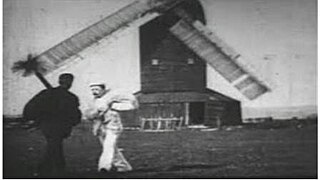
The Miller and the Sweep is a 1898 British short black-and-white silent comedy film, directed by George Albert Smith, featuring a miller carrying a bag of flour fighting with a chimney sweep carrying a bag of soot in front of a windmill, before a crowd comes and chases them away. The film, according to Michael Brooke of BFI Screenonline, "was one of the first films made by G.A. Smith, shortly after he first acquired a camera," and is also, "one of the earliest films to show a clear awareness of its visual impact when projected."

The Dark Eyes of London is a 1939 British horror film produced by John Argyle and directed by Walter Summers, and starring Béla Lugosi, Hugh Williams, and Greta Gynt. The film is an adaptation of the 1924 novel of the same name by Edgar Wallace. The film is about a scientist named Dr. Orloff who commits a series of murders for insurance money, while periodically disguising himself as the blind manager of a charity to further his scheme.

The Flesh and Blood Show is a 1972 British horror slasher film directed and produced by Pete Walker, and starring Ray Brooks, Jenny Hanley, and Luan Peters. It follows a group of actors being stalked and murdered by an unseen assailant while rehearsing a play at a derelict seaside theatre.

British horror cinema is a sub-category of horror films made by British studios. Horror films began in Britain with silent films in the early 20th century. Some of the most successful British horror films were made by Hammer Film Productions around the 1960s. A distinguishing feature of British horror cinema from its foundations in the 1910s until the end of Hammer's prolific output in the genre in the 1970s was storylines based on, or referring to, the gothic literature of the 19th century.
References
- ↑ "Pete Walker". Moviefone . Archived from the original on 28 August 2022.
- ↑ "Pete Walker". Moviepilot (in German). Archived from the original on 24 February 2023.
- ↑ "Pete Walker". Movies & TV Dept. The New York Times (profile). 2012. Archived from the original on 4 November 2012.
- ↑ Rigby 2000, pp. 254–256.
- ↑ Chibnall 1998, pp. 14, 72.
- 1 2 Walker, Pete (2014). "Flesh, Blood, and Censorship". The Flesh and Blood Show (Blu-ray interview short). Kino Lorber.
- ↑ Botting, Jo. "BFI Screenonline: Walker, Pete (1939–) Biography". British Film Institute . Archived from the original on 28 August 2022.
- 1 2 Hodgkinson, Will (10 March 2005). "'God, what a terrible film'" (review of The Pete Walker DVD Collection). The Guardian . Retrieved 6 June 2020.
- ↑ Chibnall 1998, p. 38.
- ↑ Chibnall 1998, p. 45.
- ↑ Chibnall 1998, p. 59.
- ↑ Chibnall 1998, p. 67.
- ↑ Chibnall 1998, p. 85.
- ↑ Chibnall 1998, p. 88.
- ↑ Chibnall 1998, p. 100.
- ↑ Chibnall 1998, p. 111.
- ↑ Chibnall 1998, p. 117.
- ↑ Chibnall 1998, p. 135.
- ↑ Chibnall 1998, pp. 151–155.
- ↑ Chibnall 1998, pp. 163–168.
- ↑ Chibnall 1998, pp. 175–179.
- ↑ Chibnall 1998, pp. 195–200.
- ↑ Chibnall 1998, pp. 209–210.